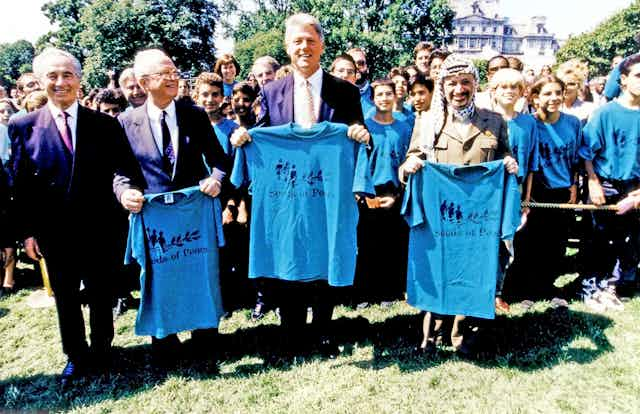To mark the 30th anniversary of the signing of the 1993 Oslo accords between Israel and the Palestine Liberation Organization (PLO), The Conversation Weekly is launching a three-part podcast series. Inside the Oslo Accords revisits the history and legacy of this landmark moment in the Israel-Palestine peace process, through interviews with some of the key negotiators involved at the time.
The series is hosted by James Rodgers, reader in international journalism and Amnon Aran, professor of international politics, both at City, University of London in the UK.
In the first episode, they speak to Jan Egeland, who was deputy foreign minister of Norway in the early 1990s, about his role in the secret negotiations that led to the Oslo accords.
On September 13 1993, when Yitzhak Rabin and Yasser Arafat shook hands on the White House lawn, it seemed the impossible was in reach: peace between Israel and the Palestinians. Rabin, then Israeli prime minister, and Arafat, the chairman of the PLO, had been taking part for months in secret negotiations brokered by Norway.
Jan Egeland, who is currently the secretary-general of the Norwegian Refugee Council, tells The Conversation Weekly why they happened in secret.
“At the time, the PLO was as much seen as a terrorist organisation as Hamas is today. People were in jail in Israel for having contacts with the PLO and within the PLO it was seen as treason to deal with the occupier, Israel, so it had to happen in secrecy and we were good at organising such a discrete back channel in Oslo,” says Egeland. He remembers that when the negotiations were revealed, “people couldn’t believe it”.
The Israeli-Palestinian Declaration of Principles, signed at the White House during a ceremony with US President Bill Clinton, was designed as a framework for the peace process. Egeland says it’s important to remember that key questions for a future peace agreement, such as the final status of Jerusalem, the issue of refugees or future borders, were not part of the agreement.
“It was impossible to agree on all of the final status issues. What we got was this mutual official recognition of the two sides,” says Egeland. He says it would have been “much better if we had full agreement of everything,” but that was impossible. “The alternative to the Oslo agreement would’ve been nothing and perpetual occupation of all of the West Bank and Gaza – which was horrific at the time – and perpetual conflict.”
When it comes to bringing an end to the conflict, he laments: “What’s heartbreaking is that it’s not easier now than it was 30 years ago in 1993. It’s more difficult than when we did not succeed.”
Listen to The Conversation Weekly for the full interview, and subscribe so as not to miss the rest of the series throughout September.
A transcript of this episode is now available.
This episode was produced by Mend Mariwany with assistance from Katie Flood. Gemma Ware is the executive producer of The Conversation Weekly. Eloise Stevens does our sound design, and our theme music is by Neeta Sarl.
Newsclips in this episode are from the Clinton Library, NBC News, AP News, AP Archive, WPIX NY News, DW News, Al Jazeera News and BBC News.
You can find us on X, formerly known as Twitter, @TC_Audio, on Instagram at theconversationdotcom or via email.
Listen to The Conversation Weekly via any of the apps listed above, download it directly via our RSS feed or find out other ways to listen.

